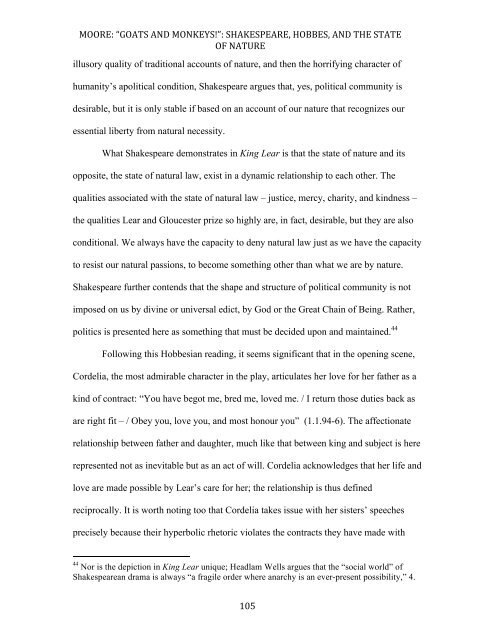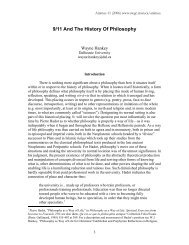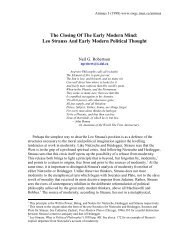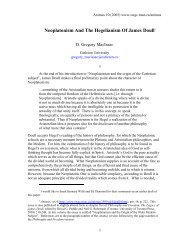âgoats and monkeys!â: shakespeare, hobbes, and the state of nature
âgoats and monkeys!â: shakespeare, hobbes, and the state of nature
âgoats and monkeys!â: shakespeare, hobbes, and the state of nature
You also want an ePaper? Increase the reach of your titles
YUMPU automatically turns print PDFs into web optimized ePapers that Google loves.
MOORE: “GOATS AND MONKEYS!”: SHAKESPEARE, HOBBES, AND THE STATE <br />
OF NATURE <br />
illusory quality <strong>of</strong> traditional accounts <strong>of</strong> <strong>nature</strong>, <strong>and</strong> <strong>the</strong>n <strong>the</strong> horrifying character <strong>of</strong><br />
humanity’s apolitical condition, Shakespeare argues that, yes, political community is<br />
desirable, but it is only stable if based on an account <strong>of</strong> our <strong>nature</strong> that recognizes our<br />
essential liberty from natural necessity.<br />
What Shakespeare demonstrates in King Lear is that <strong>the</strong> <strong>state</strong> <strong>of</strong> <strong>nature</strong> <strong>and</strong> its<br />
opposite, <strong>the</strong> <strong>state</strong> <strong>of</strong> natural law, exist in a dynamic relationship to each o<strong>the</strong>r. The<br />
qualities associated with <strong>the</strong> <strong>state</strong> <strong>of</strong> natural law – justice, mercy, charity, <strong>and</strong> kindness –<br />
<strong>the</strong> qualities Lear <strong>and</strong> Gloucester prize so highly are, in fact, desirable, but <strong>the</strong>y are also<br />
conditional. We always have <strong>the</strong> capacity to deny natural law just as we have <strong>the</strong> capacity<br />
to resist our natural passions, to become something o<strong>the</strong>r than what we are by <strong>nature</strong>.<br />
Shakespeare fur<strong>the</strong>r contends that <strong>the</strong> shape <strong>and</strong> structure <strong>of</strong> political community is not<br />
imposed on us by divine or universal edict, by God or <strong>the</strong> Great Chain <strong>of</strong> Being. Ra<strong>the</strong>r,<br />
politics is presented here as something that must be decided upon <strong>and</strong> maintained. 44<br />
Following this Hobbesian reading, it seems significant that in <strong>the</strong> opening scene,<br />
Cordelia, <strong>the</strong> most admirable character in <strong>the</strong> play, articulates her love for her fa<strong>the</strong>r as a<br />
kind <strong>of</strong> contract: “You have begot me, bred me, loved me. / I return those duties back as<br />
are right fit – / Obey you, love you, <strong>and</strong> most honour you” (1.1.94-6). The affectionate<br />
relationship between fa<strong>the</strong>r <strong>and</strong> daughter, much like that between king <strong>and</strong> subject is here<br />
represented not as inevitable but as an act <strong>of</strong> will. Cordelia acknowledges that her life <strong>and</strong><br />
love are made possible by Lear’s care for her; <strong>the</strong> relationship is thus defined<br />
reciprocally. It is worth noting too that Cordelia takes issue with her sisters’ speeches<br />
precisely because <strong>the</strong>ir hyperbolic rhetoric violates <strong>the</strong> contracts <strong>the</strong>y have made with<br />
44 Nor is <strong>the</strong> depiction in King Lear unique; Headlam Wells argues that <strong>the</strong> “social world” <strong>of</strong><br />
Shakespearean drama is always “a fragile order where anarchy is an ever-present possibility,” 4.<br />
105
















